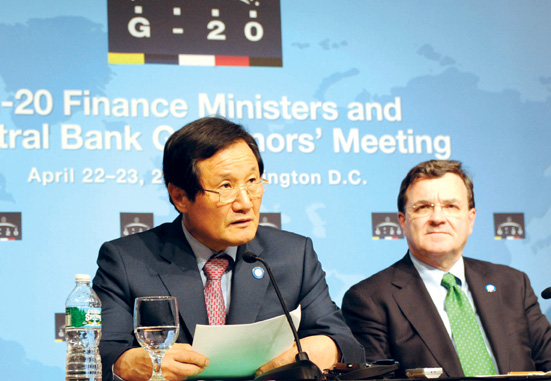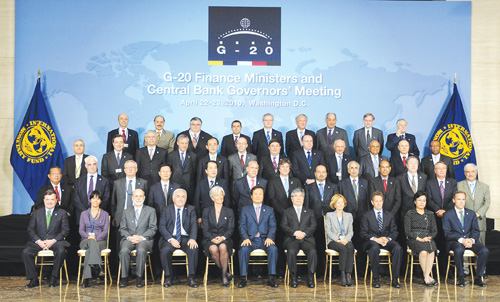Korea Chairs G-20 Finance Ministers Meeting in Washington
The nation¡¯s first such meeting deals with global economic issues and directions to solve problems

Minister Yoon Jeung-hyun of the Ministry of Strategy and Finance presided over the G-20 Finance Ministers and Central Bank Governors Meeting on April 23 in Washington, the first one for the group for this year, the ministry said last month.
The second meeting of the group is scheduled to be held in Busan on June 3-4, which will be followed by the G-20 Summits in Canada in the middle of June and in Seoul in November.
The Washington meeting was the first one chaired by Korea, as Korea will be the chair country for the G-20 Summit scheduled to be held in Korea in November, the ministry said.
Minister Yoon¡¯s role as the chair of the G-20 ministers meeting was significant for Korea as it was the occasion for the Korean finance minister to take a leadership position in dealing with global economic issues, the ministry said.
The agreements made at the Washington meeting are to be a major part of the agenda for the G-20 Summits this year.
At the meeting, the finance ministers and central bank governors discussed the current global economic issues and the directions that should be followed to put the global economy back on the right track, economic reform, subsidies for energy, and the development and reform of the international financial organizations and strategies for global financial conditions.
They agreed that the global economy is on the recovery track, generally better than anticipated, with differences in regions around the world. They also agreed that unemployment was still very high in many parts of the world.
The participants agreed that each country should develop its own policies to deal with the situation. The member countries whose economic growth depends on government stimulus should continue to provide stimulus until the economy becomes strong under the leadership of the private sector.
They also took time to discuss the evaluations of the economic conditions of the member countries that received financial support from the International Monetary Fund (IMF) and the World Bank. They agreed that the G-20 countries¡¯ common objectives were to keep their economic growth strong, sustainable and balanced.
Following is part of the communique issued at the end of the meeting:
- Recognizing the increasingly integrated nature of the financial regulatory reform issues, we reaffirmed our strong commitment to fully implement our reform agenda on the timelines agreed by Leaders in London and Pittsburgh. Good progress is being made and, to maintain the momentum, we:
We reaffirmed our reform is multi-faceted, but at its core must be stronger capital standards, complemented by clear incentives to mitigate excessive risk-taking practices. We recommitted to developing by end-2010 internationally agreed rules to improve both the quantity and quality of bank capital and to discourage excessive leverage. These rules will be phased in as financial conditions improve and economic recovery is assured, with the aim of implementation by end-2012. Implementation of these new rules should be complemented by strong supervision. We stressed the importance of the quantitative and macroeconomic impact studies underway and look forward to an update on their progress by the FSB for our June meeting.

We agreed to closely review the progress of and provide guidance and strong support for the work of the FSB, BCBS and IMF. We support the work of the FSB to develop prudential standards, market infrastructures to contain the propagation of shocks and resolution tools and frameworks for systemically important financial institutions and look forward to a progress report for our meeting in June 2010. We look forward to receiving the IMF¡¯s final report on the range of options that countries have adopted or are considering as to how the financial sector could make a fair and substantial contribution towards paying for any burdens associated with government interventions to repair the banking system. We call on the IMF for further work on options to ensure domestic financial institutions bear the burden of any extraordinary government interventions where they occur, address their excessive risk taking and help promote a level playing field, taking into consideration individual country¡¯s circumstances. We welcomed the FSB, IMF and BCBS¡¯s joint report on the inter-linkages between these issues and noted that, moving forward, we need to take into account the cumulative impact of the reforms on the financial system and the wider economy to move unequivocally in the direction of sound and stronger capital and liquidity framework; and
We stressed the importance of achieving a single set of high quality, global accounting standards; implementing international standards with regard to compensation practices and welcomed the FSB¡¯s report; completing the development of standards for central clearing and trading on exchanges or electronic platforms of all standardized over-the-counter derivative contracts, where appropriate, and reporting to trade repositories of all over-the-counter derivative contracts; and consistent and coordinated oversight of hedge funds and credit rating agencies. We welcomed the progress by the Financial Action Task Force in the fight against money laundering and terrorist financing, particularly regarding the issue of a public statement on jurisdictions with strategic deficiencies last February. We also welcomed the report by the Global Forum on Tax Transparency and Exchange of Information, the launch of the peer review process, and the development of a multilateral mechanism for information exchange, which will be open to all countries. We welcomed the launch of the evaluation process by the FSB on the adherence to prudential information exchange and cooperation standards in all jurisdictions.
- We noted the draft report on the scope of energy subsidies and suggestions for the implementation of the Pittsburgh commitment from the IEA, OPEC, OECD and World Bank. In accordance with country ownership and circumstances and recognizing the importance of providing those in need with essential energy services, we recommitted to prepare strategies and timetables for our meeting in June to rationalize and phase out, over the medium term, inefficient fossil fuel subsidies that encourage wasteful consumption.
- We urged progress to deliver on the representation and governance reforms of the International Financial Institutions agreed in Pittsburgh. We urged the IMF to deliver the quota and governance reforms by the November Seoul Summit. We look forward to an agreement on a package of voice reforms and World Bank financial resources, together with reforms to ensure effectiveness, at the upcoming Development Committee meeting. We will work towards ambitious IDA16 and African Development Fund replenishments. We welcomed the agreement in principle to increase the capital of the IaDB and EBRD and to adopt a robust reform agenda and look forward to the conclusion of discussions on general capital increase of the African Development Bank. We agreed to support full relief of Haiti¡¯s debt by all IFIs, including through burden sharing, and welcomed the agreement at the IaDB and World Bank to relieve its debt and the establishment of the Haiti Reconstruction Fund.
- We acknowledged the progress achieved by the Financial Inclusion Experts Group and look forward to the successful launch of the ¡®SME Finance Challenge¡¯. We welcomed the work of the Financial Safety Nets Experts Group and agreed to look at policy options to improve global financial safety nets, based on sound incentives, to better assist countries to deal with volatility in global capital flows. Inefficient markets and excess volatility in commodity prices more generally negatively affect both producers and consumers. We will finalize our work to address excessive commodity price volatility by improving the functioning and transparency of physical and financial markets in both producing and consuming countries.
- We agreed to meet again on June 4-5, 2010, in Busan, Republic of Korea, to prepare for the June Leaders¡¯ Summit in Toronto, Canada. nw
Minister Yoon Jeung-hyun of the Ministry of Strategy and Finance presides over a meeting of the G-20 Finance Ministers and Central Bank Governors on April 23 in Washington D.C.
G-20 Finance Ministers and Central Bank Governors are gathered for a photo session before their meeting on April 23 in Washington D.C.
3Fl, 292-47, Shindang 6-dong, Chung-gu, Seoul, Korea 100-456
Tel : 82-2-2235-6114 / Fax : 82-2-2235-0799